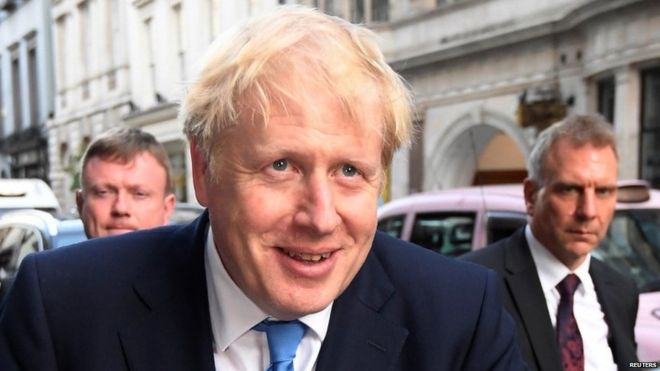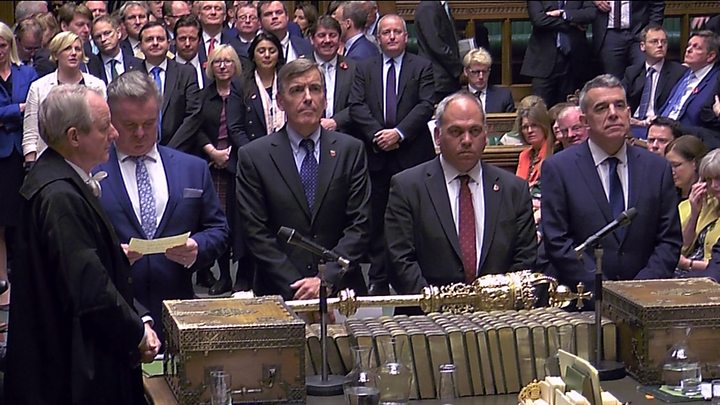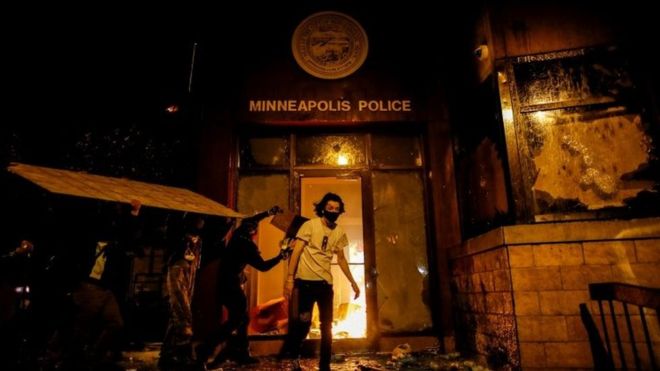Brexit: Boris Johnson to make fresh general election bid


Boris Johnson will try for a fourth time to secure an early general election, after MPs rejected his plan.
The PM will now ask MPs to approve a 12 December election through a one-page bill – which needs the support of fewer MPs than his last attempt.
But No 10 sources say they would accept an election on 11 December to get opposition parties on-board.
Mr Johnson said the “paralysis” could not go on, but Labour said a no-deal Brexit had to be taken off the table.
It follows the agreement by EU leaders to delay Brexit until 31 January.
The Commons backed the government’s election motion by 299 to 70 on Monday – but it was well short of the two-thirds of all 650 MPs whose support are needed to call an election under the Fixed-term Parliaments Act.
All Conservative MPs backed the motion, but the vast majority of Labour MPs abstained, along with the SNP and DUP. All but one MP from the Liberal Democrats voted against it.
Instead, it has published its Early Parliamentary General Election Bill, which allows for an early election to take place on 12 December.
Former Chancellor Philip Hammond – who lost the Conservative whip after voting against a no-deal Brexit – said the idea of using “precious time” to hold an election, rather than passing the government’s Brexit bill, “frankly appals me”.
But Home Office Minister Brandon Lewis said: “We have to have an election to deliver a Parliament that can get Brexit through.”
Labour’s shadow cabinet are meeting to discuss their position on the bill.
EU extension
The vote came after Mr Johnson officially accepted the EU’s offer of an extension to the Brexit deadline to 31 January.
This means the UK will not now leave the EU on Thursday – 31 October – a promise at the heart of Mr Johnson’s campaign to become prime minister.
In a letter to EU officials, Mr Johnson said the further delay – which he insists was forced upon him by Parliament – was “unwanted”.
Mr Johnson said he would persist with his efforts to get an early election, telling MPs that “one way or another” the current deadlock had to be broken.

MPs will begin to debate and vote on a bill for a 12 December election – at least its second reading – on Tuesday lunchtime.
Jacob Rees-Mogg, Leader of the House of Commons, said the government wanted MPs to debate all stages of the bill in a day.
Usually a bill is debated over the course of several days, but Mr Rees-Mogg said the legislation would be “extremely short, simple, and limited in scope”.
The bill has to pass through the House of Commons and the House of Lords before it can come into effect.
Mr Rees-Mogg added that the government would not bring its Withdrawal Agreement Bill back to MPs for scrutiny, as would be required for Mr Johnson’s Brexit deal to become law.


The date is a sticking point as things stand, but it is not impossible that will become unglued by the time MPs vote tonight.
Conversations are going on through the “usual channels” – the party whips – and they may all find a way of climbing down to agree.
But for both the government and the smaller opposition parties, they have to be willing to hold hands and jump into this together.
The SNP and the Liberal Democrats are nervous as being seen as the PM’s little helpers.
Parliament is closer than it’s ever been to an election.
But it doesn’t mean that it happens tonight and it is still possible after those MPs have walked through the voting lobbies, we still have no Brexit, no budget and no traditionally functioning government.
Why is the PM trying again?
The legislation the PM will propose on Tuesday requires a lower threshold for approval than the motion he tabled on Monday.
Mr Johnson originally tried to hold an election via the Fixed-term Parliament Act route, which is a simpler process than passing a bill as it cannot be amended by MPs.
But with the need for two-thirds of all MPs to back it – rather than just a majority of one – his attempts have failed.
Crucially for his new plan, the Lib Dems and the SNP have indicated they might be prepared to support it.
However, there are arguments over the date of an election.
Why does the date matter so much?
Parliament has to be dissolved a minimum of 25 working days before the date of an election to allow sufficient preparations to take place.
The Lib Dems and the SNP want an election on 9 December because they say that will prevent any chance of Mr Johnson’s Brexit deal being approved before Parliament is dissolved.
Both parties want to fight the election on a platform of stopping Brexit entirely.
The government hopes to persuade the Lib Dems and the SNP to agree to the 12 December date by pledging not to bring back its Brexit deal bill before Parliament is dissolved.
But No 10 sources have said they would accept a Lib Dem/SNP amendment allowing an election to take place on 11 December.
Earlier, Home Office Minister Brandon Lewis said 12 December was “the right date for a general election”, arguing a poll any earlier would not allow time for the government to pass “key pieces of legislation” – including around budget issues in Northern Ireland.
However, Lib Dem leader Jo Swinson told MPs she did not trust Mr Johnson’s assurances.
The government maintains it would be very difficult for an election bill to pass through both the Commons and the Lords, and receive Royal Assent by 00:01 on Friday in order to meet a 9 December deadline.
How do other MPs feel about an election?
Most Labour MPs abstained from Monday’s vote.
The party’s leader, Jeremy Corbyn, said he would consider the legislation, but would only support an election once a no-deal Brexit had been taken off the table.
He also called for assurances that students would not be “disenfranchised” if the vote was held outside term time.
But speaking to BBC Radio 4’s Today programme, shadow international trade secretary Barry Gardiner said a 9 December election “certainly would” appeal more than a 12 December vote.
The BBC’s Laura Kuenssberg said there was a split in the party over whether to hold an election, with some MPs worried about their standings in the polls and confusion over their Brexit policy – to negotiate a new deal then hold another referendum.
The DUP, which opposes Mr Johnson’s Brexit agreement and which abstained in Monday’s vote, could also potentially come on board – meaning the simple majority of one could be achieved.
But the government may also need support from those MPs who had the Conservative whip removed for voting against a no-deal Brexit.
One of those MPs, Mr Hammond, said: “I think the government is trying to create a narrative that Parliament is blocking Brexit and therefore we need an election. But, that is simply untrue.”
The former chancellor argued the real motivation for an election was to “change the shape of the Conservative Party” and to “get rid of a cohort of MPs that it regards as not robust enough” on Brexit.
“There is a piece of blatant entryism to change what the Conservative Party is about,” he added.
However, the now-independent MP also said: “It really doesn’t matter how many times my party kicks me, abuses me, reviles me. They are not going to stop me feeling like a Conservative.”
BBC





